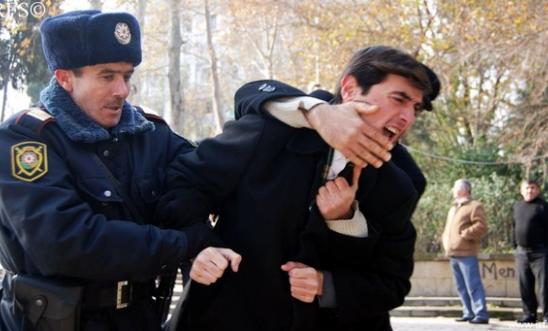Azerbaijan has assumed the Council of Europe chair amid a dire human rights situation within the country. The taking over of the chairmanship of the decision-making human rights institution takes place in light of Azerbaijan’s unseemly track record of human rights abuse, as highlighted in Amnesty International’s report Behind Bar’s: Silencing dissent in Azerbaijan, released recently.
The report finds an trend of increased repression in Azerbaijan since the October 2013 elections, and documents “how harassment, beatings, and unfair trials, detention and imprisonment are routinely used in Azerbaijan to control and curb the voices of opposition parties, independent media outlets, and any other individuals critical of the government.”
Just last week a court in the capital, Baku, sentenced eight NIDA activists to prison terms of between six and eight years. The charges–drug possession, explosives and intention to “cause public disorder”–
Outside the courthouse after the reading of the sentence, police broke up NIDA supporters and others gathered there, detaining at least 26 activists and journalists.
NIDA–which is the Azerbaijani word for “exclamation”–was founded in 2011 by a small group of young people purposing to enact democratic and social changes in the country. The group currently has 350 members, including several politicians.
At the time, Amnesty International’s Deputy Director of the Europe and Central Asia Programme, Denis Krivosheev, said, “This verdict is an affront to human rights and a timely reminder of Azerbaijan’s continued refusal to respect basic freedoms.”
The Council of Europe is comprised of 47 member states. It is a decision-making human rights institution, based on the principles of the European Convention on Human Rights.
Azerbaijan, the oil-rich country bordering Russia, Georgia, Armenia and Iran between the Black and Caspian seas, assumed the chairmanship of the Committee of Ministers of the Council of Europe on Wednesday, May 14 2014.
By James Haleavy
Sources:
